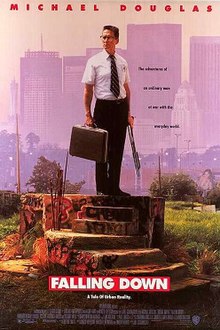Joel Schumacher’s urban paranoid tale, Falling Down, plays with the notion of a protagonist who’s an ordinary man on the verge of becoming a deranged psychopath.
Grade: B+ (**** out of *****)
| Falling Down | |
|---|---|

Theatrical release poster
|
|
Playing it both ways, the filmmakers also cannot determine whether we should feel sympathy or sorry for the “victimization” of their white all-American yuppie (anti) hero.
Michael Douglas plays with gusto D-FENS, an Everyman whose life literally collapses and his sanity shatters during traffic jam on the freeway on an extremely hot day–as expected, the car’s air-conditioner fails to work.
We soon learn that D-FENS was laid off from his defense-industry position after years of devoted service and that he has hard time accepting a separation from his wife (Barbara Hershey) and daughter.
The film intercuts between Douglas and Robert Duvall’s LAPD detective Prendergast, a burnt-out cop determined to catch the deranged man on his last day before retirement. The narrative is structured as a road movie, a series of rampages (actually encounters) perpetrated by Douglas against a Korean grocery store owner, Latino hoodlums, etc.
Thematically, Falling Down can be located somewhere between Larry Kasdan’s more civilized and tame Grand Canyon and John Singleton’s grittier Boyz ‘N the Hood.
It is a shrewd, nasty–at times wickedly funny–movie that probes the fine line between normal existence and over-the top conduct, which spins out of control.
I will not be surprised if some people dismiss it as a variation of the Charles Bronson or Clint Eastwood vigilante movies of the 1970s. Indeed, the locale and the characters may be new, but the ideology is rather familiar.
Set in the post-riots Los Angeles, the movie deceives us into believing that it seriously acknowledges the multi-culturalism of this supposedly city of the future. But after the first scene, it becomes clear that the highly manipulative Falling Down only pretends to have a social conscience.
In moments, the saga comes across as too calculating, shamelessly exploiting every ethnic minority–Latinos, African-American, and Asian–for its avaricious purposes.
Though well cast, all three female parts in the movie are minor and vastly underwritten. In a comeback role, Tuesday Weld plays Duvall’s emotionally neurotic wife; Rachel Ticotin is cast as Duvall’s matter-of-fact police partner; and the beautiful Barbara Hershey plays Douglas’ terrified ex-wife.
While the ethics of D-Fens’s methods are questionable (and reprehensible), there’s relatable resonance about his reaction to everyday annoyances, easily recognized by most urban dwellers.
Perfectly cast, Michael Douglas renders a hypnotic, mesmerizing performance that makes almost every encounter dangerously believable.
Falling Down taps effectively into Americans’ worst collective fears and nightmares, and, considering that it’s well-made and well-acted, the movie might be even more alarming than intended to be, as ultimately it offers an engaging entertainment.
Falling Down is the kind of seductive movie, revolving around one angry white male, whose images are bound to linger in memory long after the story is over.
Credits:
Directed by Joel Schumacher
Produced by Timothy Harris, Arnold Kopelson, Herschel Weingrod
Written by Ebbe Roe Smith
Music by James Newton Howard
Cinematography Andrzej Bartkowiak
Edited by Paul Hirsch
Production companies: Le Studio Canal+, Regency Enterprises, Alcor Films
Distributed by Warner Bros.
Release date: February 26, 1993 (US)
Running time: 112 minutes
Budget $25 million
Box office $96 million










